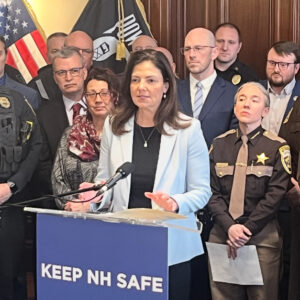Under the tougher new bail laws promoted by Gov. Kelly Ayotte and signed into law in March, Sandra Marisol Fuentes Huaracha would have been safe from her violent ex, Michael Gleason Jr., after he attacked her in April.
The law doesn’t go into effect until September 21. That’s why Gleason was able to walk into La Casita restaurant in Berlin on Sunday morning with a shotgun, shoot Marisol to death, then go into the bathroom and take his own life.
The story of Marisol’s murder shocked the Berlin community, and it was brought up by their Executive Councilor, Joe Kenney (R), at Wednesday’s council meeting. Kenney was hosting the council at the Mount Washington Hotel in Bretton Woods, about 35 miles from the crime scene.
“People just ask me how could this happen to a vivacious, young 25-year-old who had everything to live for and had in front of her,” Kenney said. “And it was all taken away because of a court system that basically gives a limited bail amount to this estranged husband.”
Ayotte ran for governor last year on a pledge to repair the bail reforms pushed by Republicans in the legislature and signed by Gov. Chris Sununu.
“The broken bail law was a failed social experiment that created a revolving door for violent criminals in our state,” Ayotte said when she signed the new bail bill into law.
“Today, we slammed that revolving door shut.”
For the Republican governor, the Berlin murder provided proof that the new law was needed.
“My heart goes out to the family and the community,” Ayotte told the council. “And you know, having been attorney general and having been a murder prosecutor myself, unfortunately, in our state, about 50 percent of our homicides are domestic violence related.”
Ayotte discussed the need for protective orders and ensuring they’re implemented properly in cases like these before turning to the bail reform fix.
“There’s a reason why one of the first priorities I had as governor was to make sure that we reversed some of the so-called reforms that were made that led to these unintended consequences that were very tragic,” Ayotte said.
Under the new law, the bar for holding suspects on serious offenses, such as those committed by Gleason, will be lower, keeping more repeat offenders off the streets. And a judge, not bail commissioners, will set bail for suspects charged with serious crimes. Law enforcement can also hold an offender for up to 36 hours without bail before arraignment.
As for the Gleason case, Ayotte said, “My initial assessment is, it would have made a difference.”
This horrific crime is also highlighting another piece of newly passed legislation, the state’s new Domestic Violence Fatality Review Committee. Senate Majority Leader Regina Birdsell (R-Hampstead) filed the legislation creating the committee on behalf of Attorney General John Formella.
The 17-member committee, which will be part of the state’s Department of Justice, is charged with conducting “comprehensive, multidisciplinary reviews of deaths related to domestic violence” with the goal of finding ways to protect potential victims. It’s also tasked with evaluating the response of law enforcement and making recommendations to improve how these cases are handled.
“Domestic violence is one of the most prevalent and dangerous crimes happening today,” Birdsell said. “Its victims are not just the partners or family members but also the police officers who answer those calls. Nationwide, 43 officers have been killed answering domestic violent calls.”
The attorney general’s office gave NHJournal this statement Thursday morning:
“The New Hampshire Department of Justice has an open and ongoing homicide investigation into the recent murder-suicide in Berlin. While we cannot comment further on the specifics at this time, we have certainly heard the concerns raised by Councilor Kenney and members of the Berlin community.
“This case appears to underscore the importance of the reforms the New Hampshire Department of Justice has been working to advance. The NH DOJ led the effort to pass Senate Bill 140-FN, which formally establishes the Domestic Violence Fatality Review Committee in statute. The committee will conduct confidential, multidisciplinary reviews of domestic violence-related fatalities to identify opportunities for earlier intervention and stronger coordination across systems.
“The Department also supported the bail reform measures enacted earlier this year. Although these changes were not yet in effect at the time of the incident, they are intended to better address high-risk cases involving serious charges, including those related to domestic violence.”





